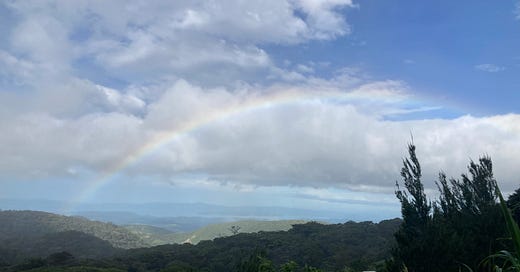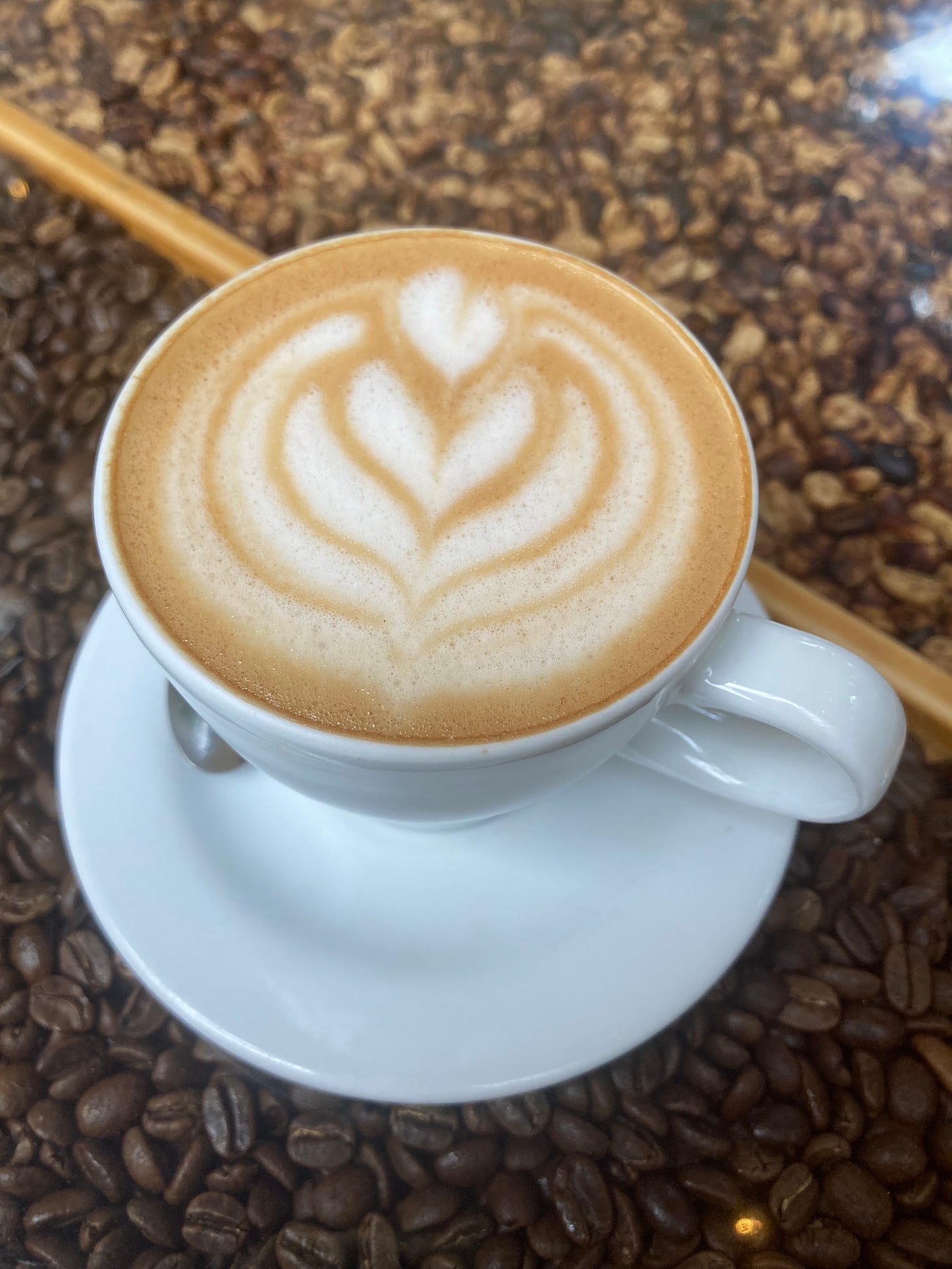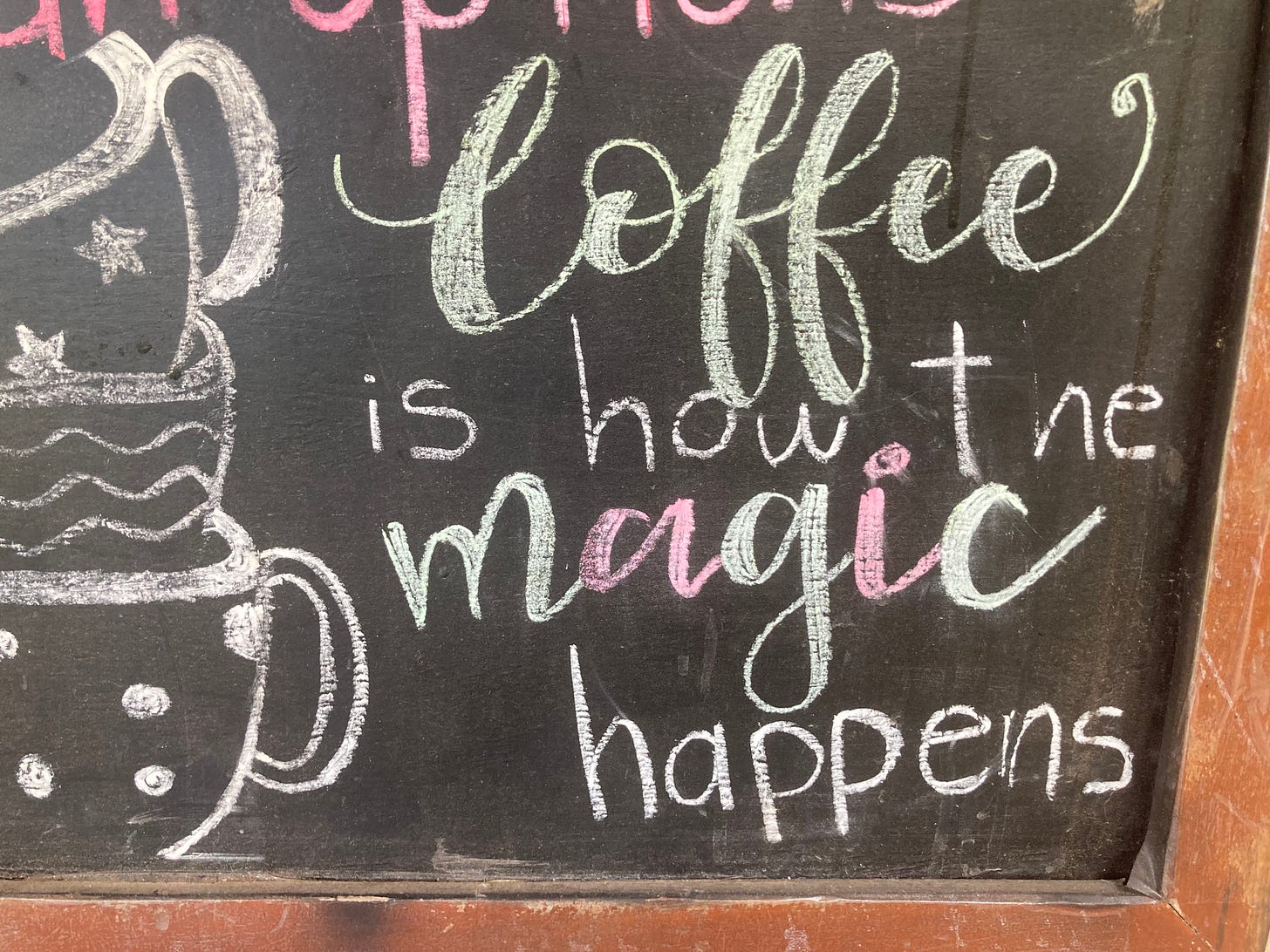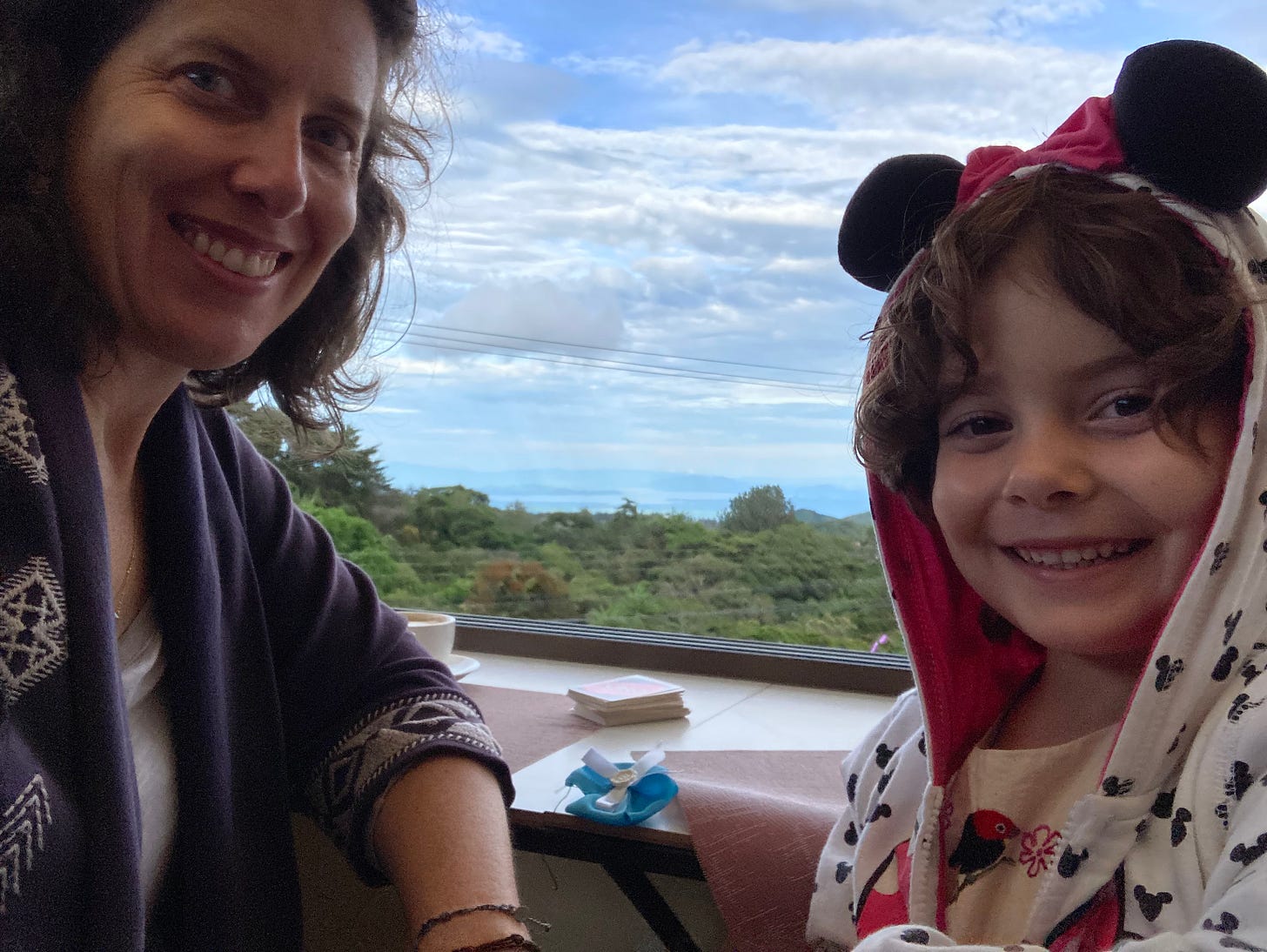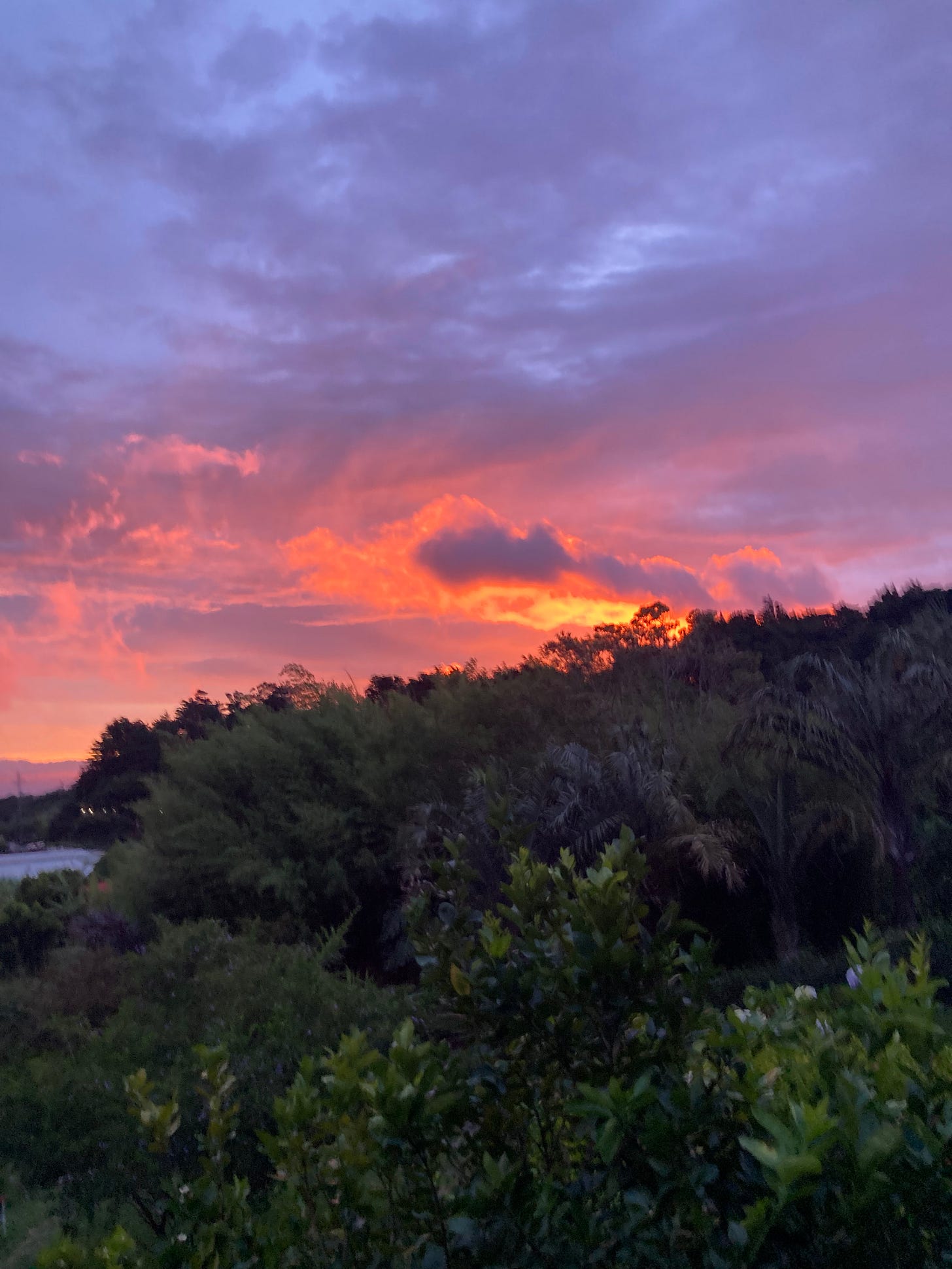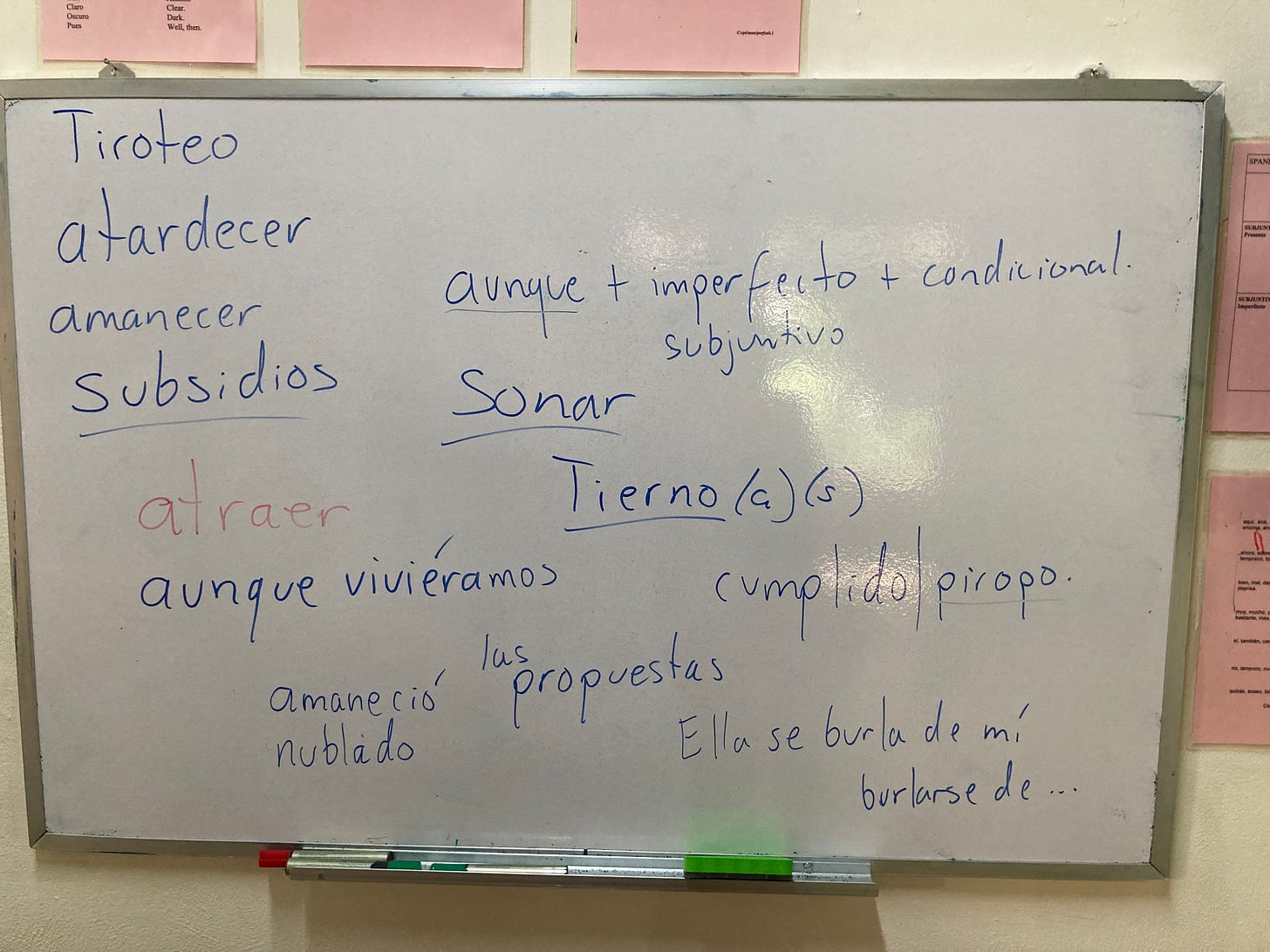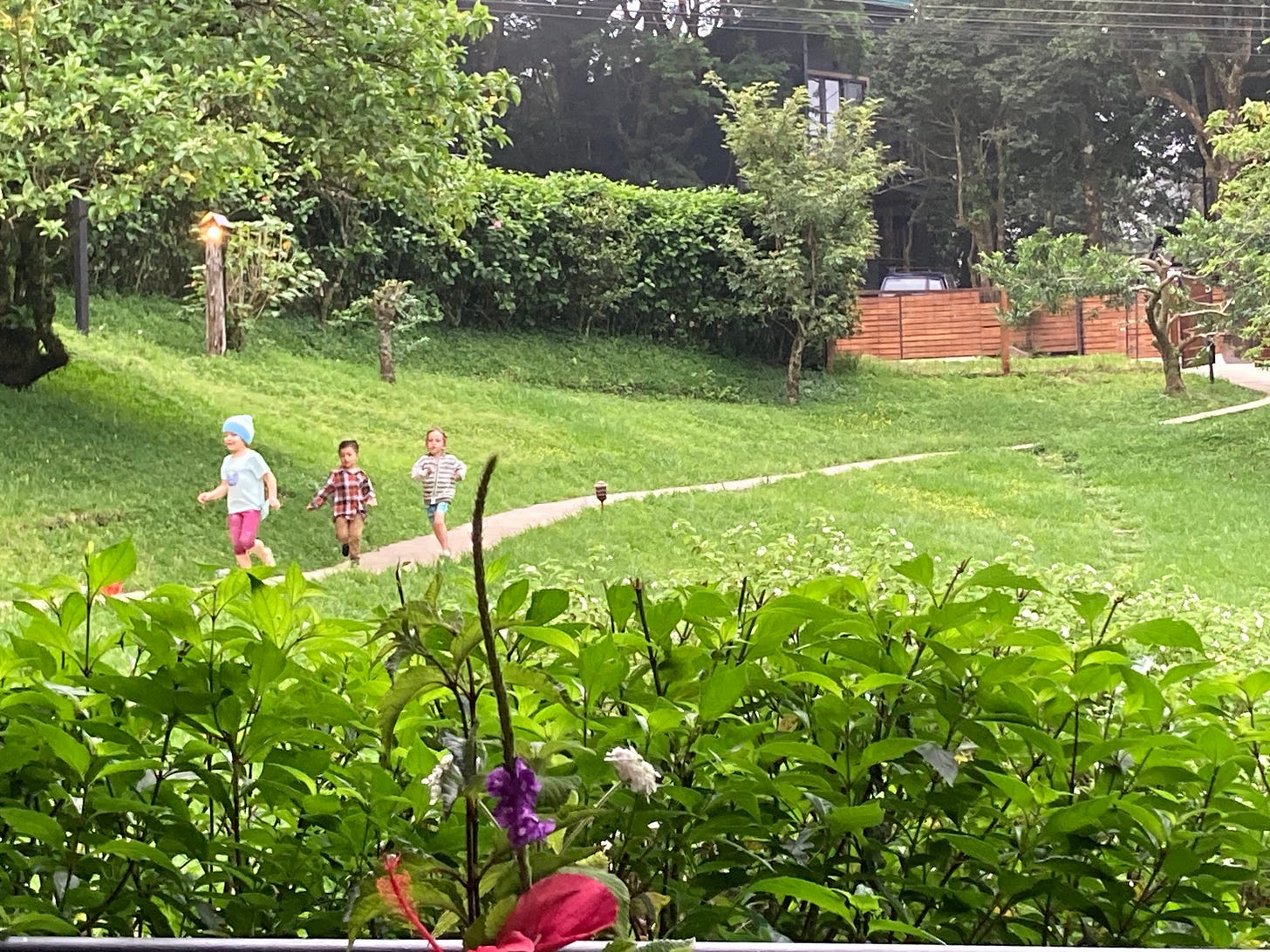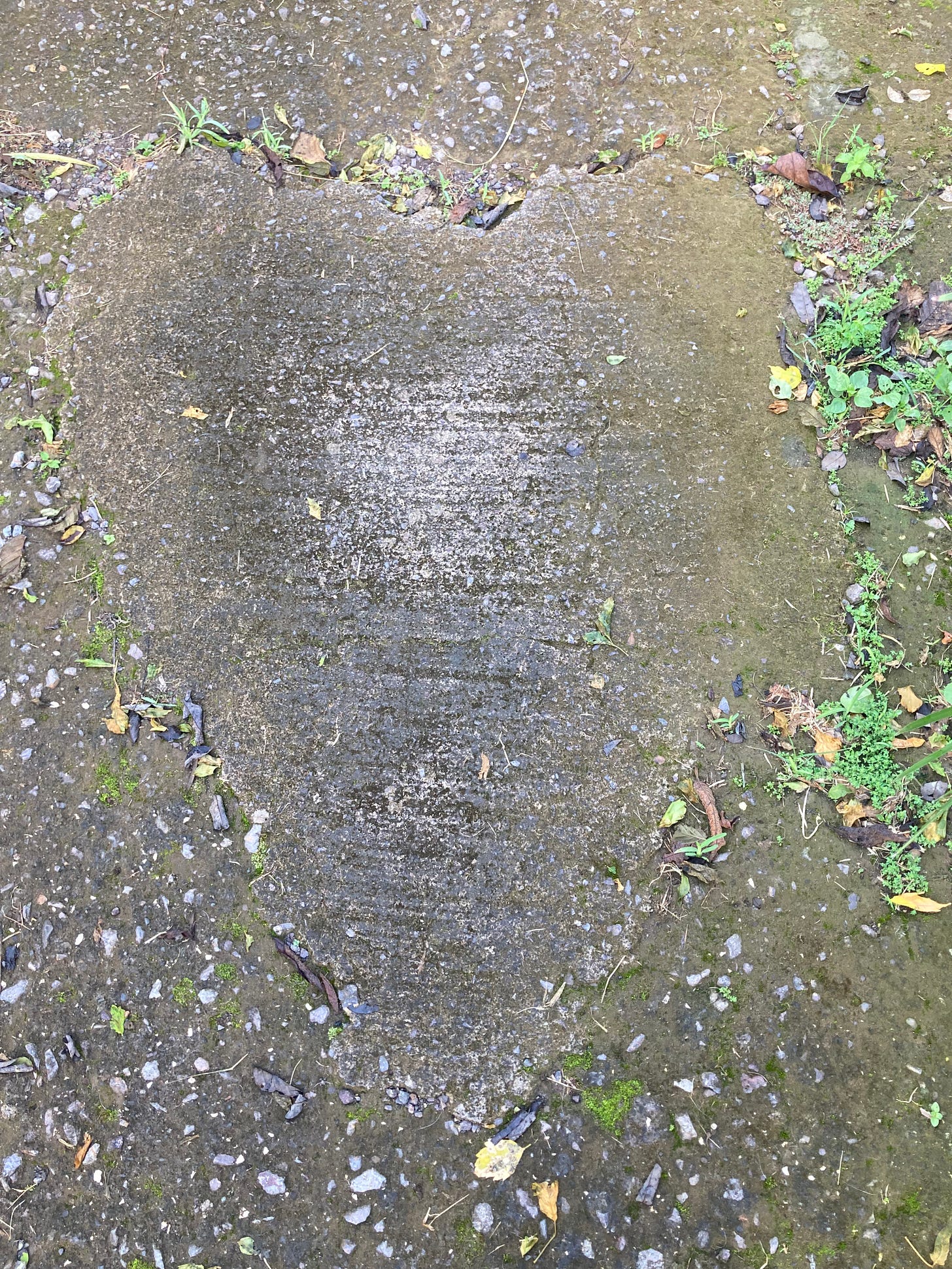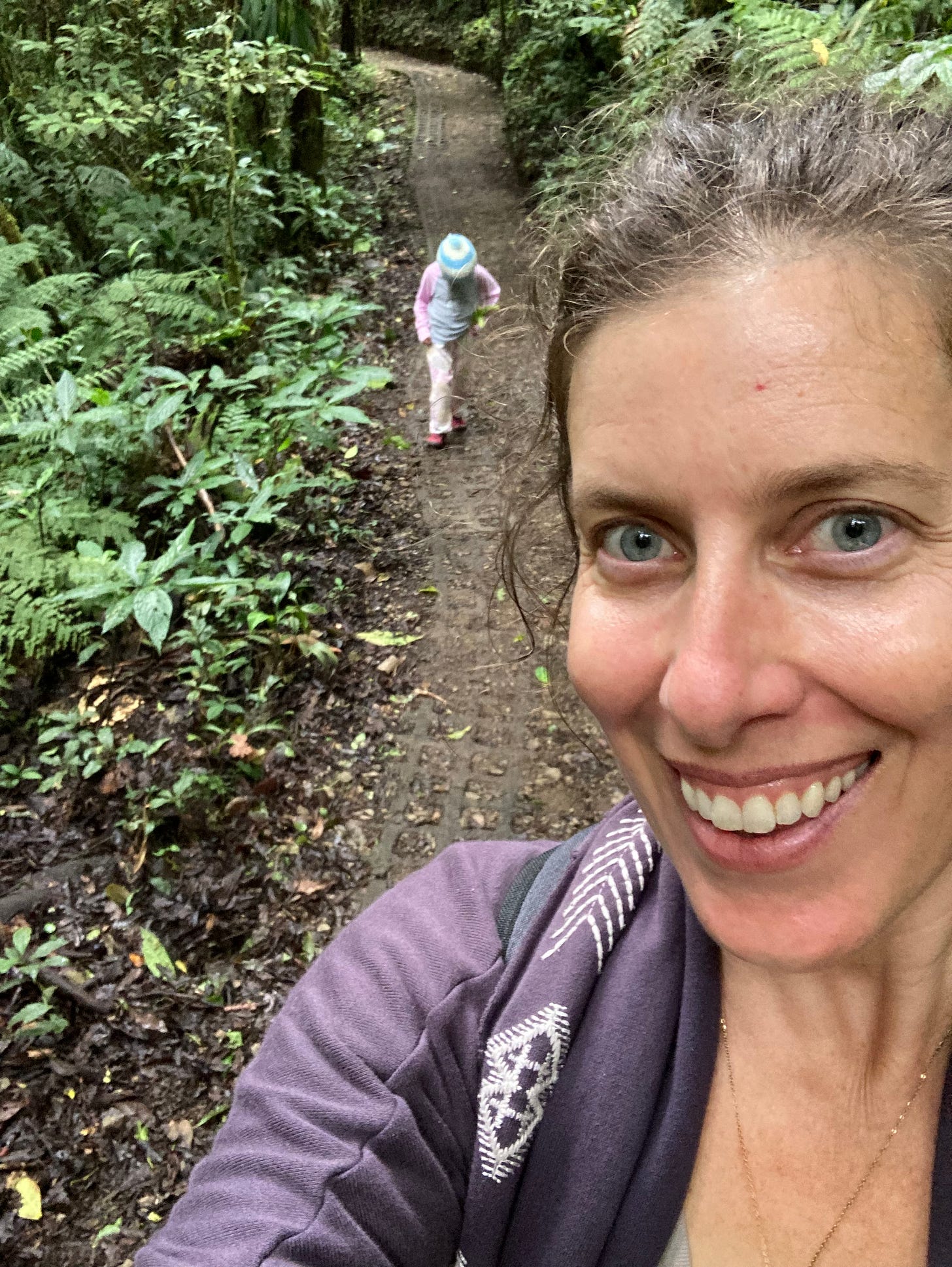We are approaching the end of our week in Monteverde, taking Spanish immersion classes and exploring the area. As I shared in my post on retreating, I was trying to make this as much of a “retreat” as possible, given current conditions of not really being able to retreat. Here are some notes of what I observed and experienced in terms of supportive conditions, challenges, and practice.
Supportive conditions: A beautiful place. A good book. Coffee. Housekeeping service. Unplugging from social media and work.
We stayed in set of apartments at the Spanish immersion school (CPI, which I highly recommend!). I didn’t know what the set-up would be, but the location was great, outside of the bustling town of Santa Elena with beautiful views of the Gulf of Nicoya and the forests between. They had daily cleaning service, and this is one small but huge thing that made my life more retreat-y this week. As a full-time working solo parent, having some support around basic tasks is a huge relief. I am grateful to the cleaning staff and will tip well when we leave.
Coffee is how the magic happens.
Nothing more to say about that - for me, it’s true! Monteverde is a coffee growing region and I drank a lot of good coffee this week. As an aside, something I realized this week is that I often make more coffee than I actually drink, and my coffee game would be enhanced by simply making it one cup of it at a time.
In spite of unplugging from work, I had several funny/bizarre work-related dreams, which makes me think about how we can “unplug” from things and not give them our attention and energy, but we are never separate and always entangled with them, even in our dreams.
Challenging conditions: solo parenting. Decision making (as exhaustion, as distraction). But challenging conditions are fodder for practice.
Decision fatigue is real.
I remember feeling decision fatigue acutely during the peak of the pandemic, when every single minute life decision in involved this excruciating calculation (and still does for many) - whether to get groceries, get takeout, go to the doctor, whether it was worth the risk of exposing yourself, potentially exposing others. All of it was utterly exhausting.
This week, I found myself needing to make more decisions than usual around what Daphne and I what we were going to do outside of classes, and while I try to include her in those decisions as much as possible, sometimes her input is not the most helpful (often around basic things such as public nudity, cleanliness and hygiene, etc.). I would be able to decide for myself quite easily, but having to decide for her and I together involves a whole other calculation - what is realistic, what will she actually enjoy, how tired is she, what is the likelihood of a complete meltdown, etc. I found myself, this week spending a lot of time making decisions, and it was exhausting (which I also realize is a privilege to have choice about what to do with my time and money and how to spend it). This leads to the next point:
Even when you go off of social media, it is easy for other distractions to fill the void.
I decided to go on a social media fast for our week here, and I easily stuck to that. However, decision making (and researching and looking at maps and schedules etc.) about our spare time ended up filling my spare time. I was constantly looking into different parks or activities or restaurants, calculating walking distances or figuring out transportation, or trying to decide which park would be best for us to walk (while knowing I might end up having to carry her, she who is no longer small), staring at Google Maps. I purposely went off of social media this week, with the intention of giving myself more spaciousness, but by Friday I found that I had filled so much of this time with trying to decide what to do. Yes, there was reading (The Heroic Heart by Jetsunma Tenzin Palmo, which has been very nourishing accompaniament), and drinking a cup of tea, and watching sunset, but I didn’t feel the spaciousness I thought I would, in part becuase the space was so easily filled with decision making and planning.
This reminds me of two key teachings I have referenced in previous Enchantable posts that I want to return to:
A few months ago in a post on re-imagining education I wrote about a teaching in a podcast episode from Brother Phap Hu of the Plum Village tradition that the schedule is a teacher. And I was thinking about how, on a meditation retreat, the schedule is both full and spacious, and it is completely decided for you, so that you do not have to think about what time you are eating dinner or where or when you are going to do walking meditation or where. Wow, there is an immense amoung of energy freed up when you are not having to make these decisions. And this is exactly what Phap Huu was talking about in this podcast episode. The predictability of a schedule gives us freedom. Not having to decide basic things gives more spaciousness. This is part of what we can rest into on a retreat. We don’t have to think about what we are going to do - the schedule is set. This week made me fully realize and appreciate this, and how for future quasi-retreats, I might want to try setting a schedule for myself so that I can relax into it (which runs counter to my usual go-with-the-flow spontaneous approach to travel).
Relatedly, a few months ago I recommended Rick Rubin’s book The Creative Act, and this week was revisiting the section on Habits, in which he discusses how important our daily habits are to creative practice. Rubin writes:
Put the decision making into the work, not when to work. The more you reduce your daily life-maintenance tasks, the greater the bandwidth available for creative decisions. Albert Einstein wore the same thing daily: a gray suit. Erik Satie had seven identitcal outfits, one for each day of the week. Limit your practical choices to free your creative imagination.
I feel this one in my bones. I feel it in my exhausted mom-brain that is constantly making decisions for two people (one of whom does not yet have a fully developed decision making faculty, lol). In this passage, both examples Rick Rubin uses are about dress - and mind you, the way you dress could be a great sense of joy and a part of your creative expression (as it can be for me). I don’t think the point is not choosing what to wear - it is determining where can we simplify so that more of our energy and attention is freed up for more creative and generative activities. And after spending a week in ultra decision making mode (having to make more decisions than in our normal everyday life routines), I am taking this away in terms of how what decisions I can eliminate or simplify in my daily life so as to create more spaciousness and energy for creativity, and also taking this away for future vacation-retreat scenarios.
Being on “vacation” as the solo parent of a 5 year old is not exactly relaxing. There have been a lot of tantrums. It has been challening. There are no breaks. Despite my best efforts, it has not felt very reteat-like. There have been moments, yes, but on the whole, no.
And this is where The Heroic Heart has been great companionship, as one of the main messages of the book is making everything a practice and part of the path of awakening unbound compassion (the book’s subtitle). This is not easy. Whatever is happening can be part of our practice. From the chapter Embracing Adversity:
Everything has to be used…rather than discarding the obstacles and problems in our lives, we can make use of them in our practice because the understanding is that if things always go too smoothly, we can be lulled into thinking that we are much more advanced practitioners than we actually are. If everyone is lovable, it is easy to be loving… (p. 79).
Obviously our children are lovable. But parenting - perhaps especially this flavor of solo parenting - offers many, many, many opportunities to practice - mindfulness, patience, compassion, patience, patience, patience. Many opportunities to be triggered, exhausted, and at wit’s end. Many opportunities to start over and try to respond differently. Regardless of parenting status, we all have conditions in our life that are challenging, and our biggest challenges can be the greatest terrain for growing our compassion - for others, and ourselves. This is not easy, but it’s true. And this week has been full of such opportunities.
Overall, amidst supportive and challenging conditions, it has been a good week in a beautiful place and I have learned a lot of Spanish (and Daphne loved her classes more than I could have imagined - most of her tantrums were around wanting more Spanish class, actually). In my lessons we focused on the subjunctive (sigh!) and Costa Rica-specific vocabulary, and had a lot of great conversations with my fantastic teacher Ale. To trace my notes is to trace the contours of our divergent conversations and topics:
tiroteos - shootings, describing the US
ajustar cuentas- settle scores, talking about violence in Costa Rica
dar a luz (to give birth- literally “to give the light,” how beautiful (que cosita más linda)
mejenga- a pickup game of futbol
batear- to guess wildly
alzar - to carry children
adolorido- sore (in my case, from alzando)
un pozo- a water well, talking about Niger
Me encanta que hayamos venido. I’m glad we came.
I am leaving with both renewed confidence in my abilities, and also a (rather brutal) awareness of how much I don’t know and how much more I need to practice and study.
I have very few if any regrets in life, but if I have one, it is that I didn’t keep up with and deepen my Spanish language skills. If I had kept up with them since I started when I was 15, I would be fluent with ease now, but I didn’t take my classes seriously in high school, and learned as much as I needed to get by in a good enough way, and regret having not kept up with it.
Well, no time for regrets really, and speaking of spaciousness, now that we have been in Costa Rica for nearly a year, and I am feeling más o menos settled into our life and my work, I feel like I have some energy to devote to Spanish. To upping my game. To being a better guest here. To being able to be in deeper relation with my Spanish-speaking friends and communities. To be of better use and service. To open my world and mind and heart. So many reasons.
Daphne might reach fluency before I do, with more ease. Today I was telling her I wonder what she’ll think about all of this someday: whether she’ll think how annoying it was how her mom dragged her around the world learning new languages, or whether she will appreciate it. I can’t decide that for her, but I hope someday she’ll be glad she learned Spanish at such a young age. I also often wonder how all of this is for her, and I am sure it is hard for her too- only having me to rely on (proximately), learning a new language and living far from family, from “home.”
On our last night, we ended up at a brewery for dinner that was far cooler than I am these days. A DJ playing electronic music I loved in my 20s at 4pm, meanwhile I realized as we sat down that my shirt is inside out (which I had realized earlier but forgotten to do something about). Daphne found two playmates around her age - one Costa Rican and one Swiss - and they happily played together on the lawn with their three languages. I sat and looked at the pond and reviewed my Spanish notes while she was happily playing.
Children need other children.
They need other adults.
They need us.
We need each other.
We all need each other.
I am grateful to this beautiful place for holding us this week. It has also made me appreciate our beautiful life and home in Ciudad Colón. Colón is not a tourist destination - and I think that makes it a nicer place to live. The forest surrounding campus are as beautiful as any of the parks and reserves we have visited. As a student said to me recently, we are lucky for every moment we get to spend in the UPEACE bubble, and I am feeling that, deeply.
My Spanish teacher was asking if we had a home back in the US, and I said no. We don’t we don’t have a specific place to return to. We have many places that are home, that will always be home. But we do not have a home. Home is here, right now. This is where we live. This is it.
One of Thich Nhat Hanh’s core teachings - which I have an original calligraphy of - is I have arrived, I am home, in the here and the now. The present moment is our home. We are at home in ourselves in this moment. There is nowhere else. This is it (another favorite teaching which I happen to have tattooed on my wrist).
I hope that maybe from all of this, Daphne takes away a sense that home is in her heart, in this moment, and that she can be at home wherever she is. Again, we will see.
For now, it’s her, and me, and the trees.
Thank you for being here, truly! I often sit down thinking I have a little to share, some ideas of things I want to say, and it always ends up going in unexpected directions that I would have never discovered if I weren’t writing to you. So really, truly, thank you. I hope you find something of value here, and I hope you keep coming back :)

